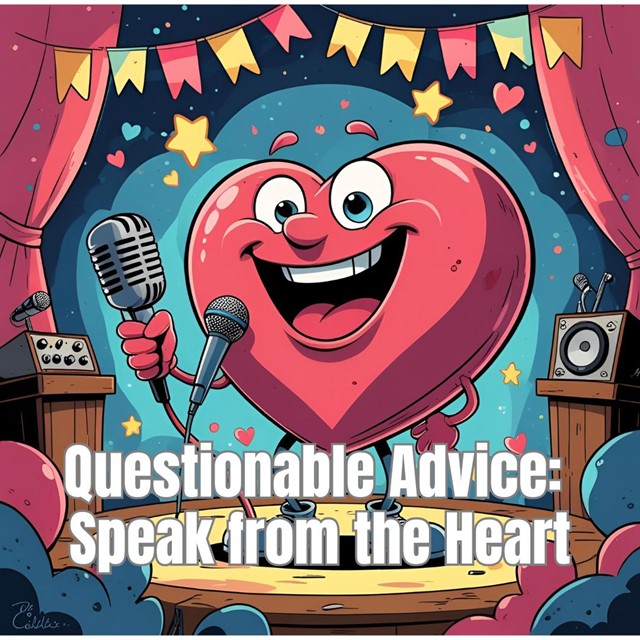
Imagine the audience naked? Pace the stage to add energy? We consider--and challenge--some of the common public speaking advice that goes around.
If you've been watching the Apple TV series Stick, you may have caught the scene that really made us laugh: The "villain," retired PGA golfer Clark Ross, stands shirtless in front of a mirror, smugly practicing a speech that opens:
"I prefer to just speak from the heart."
Just speak from the heart. It's frequent advice we hear handed out to public speakers—in the name of heightening authenticity or presenting yourself as an expert or making a speech more entertaining.
We're not so sure about any of that—and we've written before about the problem with the speak-from-the-heart approach. Clark Ross (thanks to the skills of actor Timothy Olyphant) has inspired a revisit.
Here's why we question that advice.
Speaking from the heart or shooting from the hip?
Long-time Buckley coach Karen Kalutz has often noted, "When you hear a speaker say 'I'm just going to speak from the heart,' that’s code for we’re going to be here a long time."
Maybe you feel a bit of truth for yourself in her observation. Sometimes, when presenters choose to speak from the heart, they're hoping to avoid the hard work of preparing.
It might work out okay. Way too often, though, audiences wind up with rambling and fluff they could have done without from a speaker who may not ever clearly make a point.
Notes help a speaker focus a message. A written text helps presenters use the best words and speak concisely. For speakers who don't want to sound canned, these tools can still be an alternative to speaking from the heart:
- Formatting notes for ease of delivery can help a speaker use them without creating a distraction
- Well-timed eye contact and a little practice can still give you a natural delivery
- It doesn't have to be an all-or-nothing proposition: parts of a speech can still be unscripted even when you have a plan
Your heart or theirs: Where's the focus?
Showing the audience what's in your message for them is one of your most important moves as a speaker.
When people speak from the heart, they can wind up speaking too much about themselves instead of making the message about the audience: These speakers talk about their passion for a topic, for instance, instead of telling the audience why they’ll have passion for it.
One of the advantages of preparing material is that you can figure out what you have to offer your audience that’s of value to them.
Experts can overwhelm with what they know
In some organizations we work with, we notice this strong belief:
"If you really know the topic, you should be able to present it without notes."
Our experience working with scientists, engineers, economists, and other smart people has convinced us otherwise. Experts need notes, too. Yes, they know their stuff. The problem is usually that they know too much—and want to say it all.
Notes keep experts organized and remind them of what to include and what to leave out. Often, a specific audience doesn't need to know everything. They just need to know what they need to know.
Advanced planning and speaker notes help the subject matter expert provide the right amount of information in the right way.
Authenticity AND a plan
Every speaker we know wants to be genuine. Speaking from the heart and practicing a message don't have to be at odds. If you work out a message and rehearse delivering it so your intentions come through, you can seem authentic and give a more powerful message.
LEARN MORE
You can make eye contact and work from notes. Find our tips for that here.
Even if you wing the rest of a message, consider giving a little time to planning your first words. Here's how a strong open helps.
An experienced performer, Usher found a way to plan for a big speech and kept it authentic. Find that story here.






